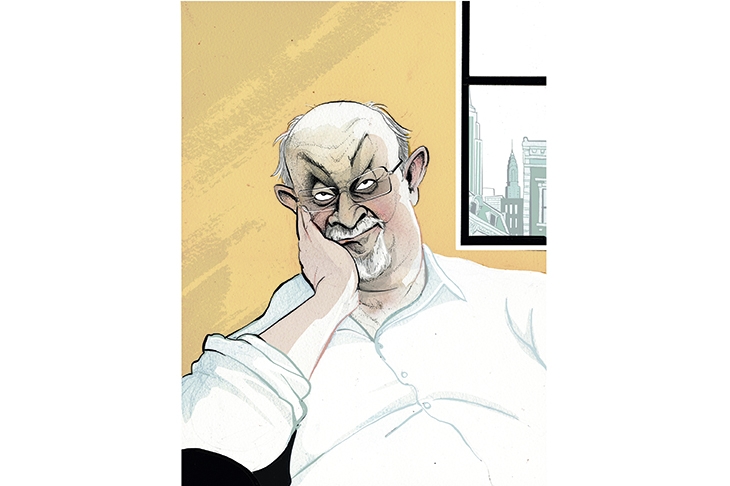After Ayatollah Khomeini ordered Muslims to kill him for publishing The Satanic Verses in 1989, Julian Barnes gave Salman Rushdie a shrewd piece of advice. However many attempts were made on his life and the lives of his translators and publishers, however many times Special Branch moved him from safe house to safe house, he must not allow the ‘Rushdie affair’ to turn him into an obsessive.
When I interviewed him ten years ago he had learned to live without fear. No shaven-headed bodyguards accompanied him as he walked into a Notting Hill restaurant. His eyes did not scour the room for signs of danger. If the other diners knew who he was, they were too well-versed in the manners of the English upper-middle class to stare at a celebrity. They did not wolf down their meals and head for the exit, just in case today was the day the bomber got through. They carried on eating as if the old fear had passed.
Like online trolls, religious totalitarians want their targets to think about them constantly. If some cannot physically harm their enemies, they will accept mentally crippling them as the next best option. The threats against Rushdie never went away. A few days before we met in 2012, the owners of the Jaipur Literary Festival venue had cancelled a booking. They feared that the mere sight of him might lead to assassination attempts, riots, injuries and deaths.
Like online trolls, religious totalitarians want their targets to think about them constantly
Rushdie seemed safe in London and New York, however. Tens of thousands of people saw a funny, kind and brilliant man at ease with himself him on the stage of conferences and literary festivals.
Rushdie got his bitterness out of his system with his memoir Joesph Anton, which recorded in, yes, at times obsessive detail, the literary figures on the left who could not condemn incitement to murder a novelist because they worried about stirring racial tension, and the politicians and journalists on the right, who hated him for being an uppity brown-skinned immigrant. Readers tut-tutted at the slipperiness of men and women who could not call theocratic terror by its true name or allowed personal feuds to trump principled commitments.
I asked why John le Carré had said, ‘My position is that there is no law in life or nature that says great religions may be insulted with impunity’.
‘I gave one of his novels a bad review,’ Rushdie replied ‘Novelists never forgive or forget’.
By the 2010s these disputes had an antique quality. Khomeini was long dead. His successors in Iran had moved on to other victims. Most people had forgotten about the fatwa, or were too young to remember Muslim demonstrators in Bradford burning a copy of Rushdie’s novel and demanding its suppression. Freedom had triumphed over fanaticism and terror. Rushdie had won.
Or half won. To say that The Satanic Verses is about religion is like saying that Hamlet is about doubt. Nevertheless it remains true that at the novel’s heart is a satire of Islam’s founding myths. Until 1989, liberal-minded writers thought they could challenge religions that claimed dominion over minds and bodies. No one expected demagogues to whip up mob-hatred against a novelist. Penguin, his publisher, and Rushdie himself had no inkling of the violence that was about to descend on them.
Now writers and publishers know it, and that knowledge changes everything. Try to imagine a liberal or-ex Muslim writer attempting a modern version of The Satanic Verses. And then try to imagine an editor at a mainstream publishing house accepting it. They would be too scared. But they would also be scared to admit they were scared because the macho ideology of publishing, the arts and journalism insists that we are brave taboo-busters, who speak truth to power without fear of the consequences. Instead of admitting their fear, they would say that they did not want to give comfort to the Islamophobic right. When I first heard that argument in the last century I thought it a specious evasion. Now it’s become a self-fulfilling prophecy. When liberals cordon off debates in no-go areas the right and far right has the opportunity to dominate the discussion.
When I made this point to Rushdie he found it too pessimistic. Cowardice resided almost exclusively in the offices of publishers, broadcasters and newspaper editors, he said. Writers should be braver and challenge them.
Now a would-be assassin has done his best to end Salman Rushdie’s challenge to the totalitarian and the obscurantist. Like many others I woke up early this morning to check how he was, and the news from his hospital was grim.
In The Satanic Verses Rushdie wrote that a poet’s work is ‘to name the unnamable, to point at frauds, to take sides, start arguments, shape the world and stop it from going to sleep’. The attempt to murder him makes that long-neglected mission more urgent than ever.







Comments